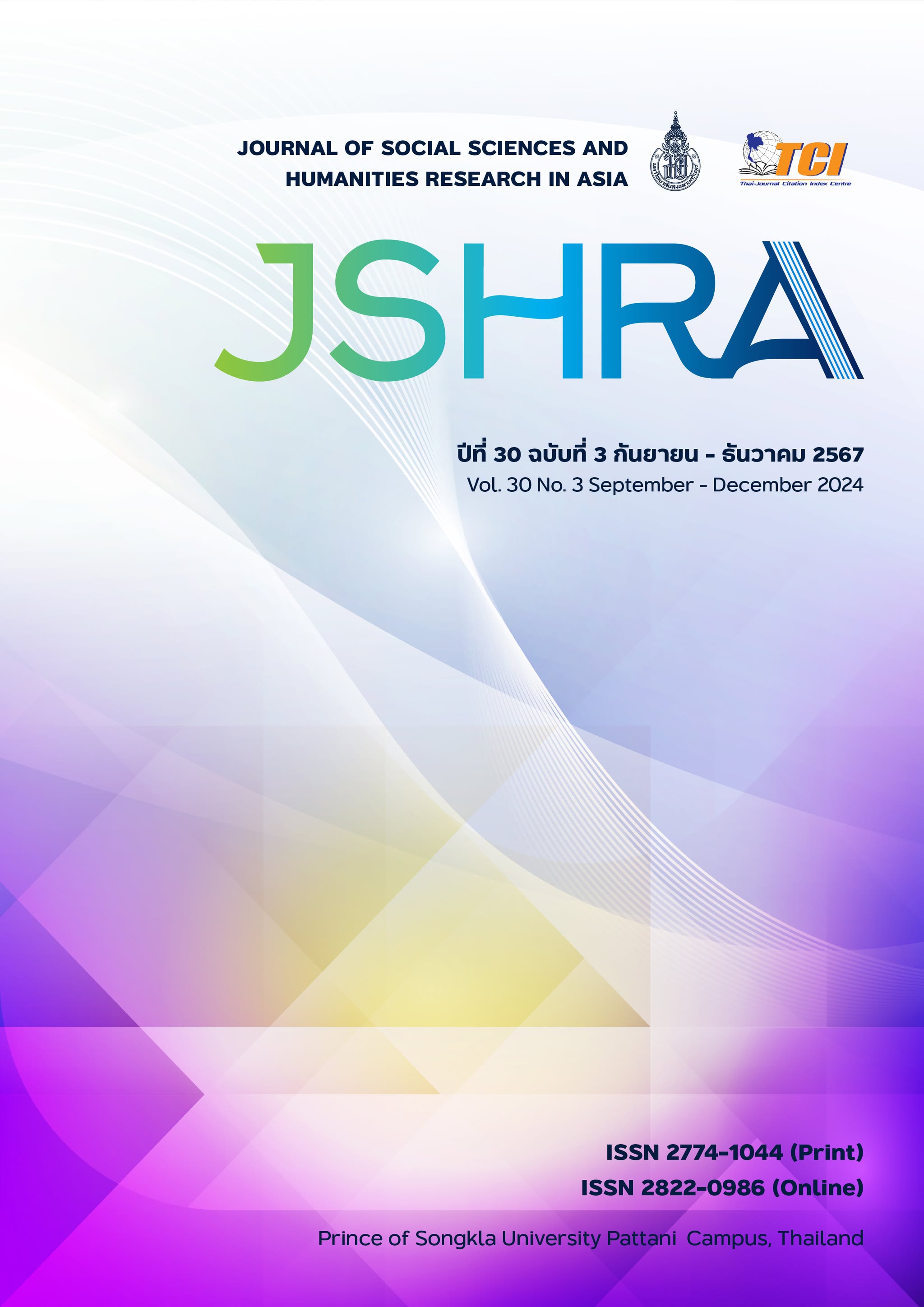Happiness and Helping Behavior in the Workplace: Links Between PERMA Well-being and Organizational Citizenship Behaviors in Thai Higher Education Context
Keywords:
Happiness, Organizational Citizenship Behaviors, PERMA Model, Positive Psychology, Well- beingAbstract
This study analyzes the relationship and influence of well-being factors based on positive psychology perspective using the PERMA model (comprising positive emotions, engagement, relationships, meaning, and accomplishment) on organizational citizenship behaviors (OCBs) among university staff using a quantitative research methodology. A sample of 101 university staff members was surveyed using two questionnaires with reliability scores ranging from .83 to .91. Data were analyzed using Pearson correlation and multiple regression. The results showed that well-being according to positive psychology is positively correlated with organizational citizenship behaviors (r=.569, p < .01). Moreover, the components of well-being, positive emotions and relationships can predict organizational citizenship behaviors (β = .400, p < .001 and β = .283, p < .01, respectively). The findings highlight the importance of promoting a work environment that enhances well-being, especially positive emotions and relationships, as they significantly influence the propensity of staff to engage in voluntary behaviors that benefit the organization's efficiency amidst various contemporary challenges. This study also extends the knowledge in the field of positive organizational psychology, focusing on well-being factors that can elevate organizational citizenship behaviors within educational institutions, and can
guide policy development to improve organizational culture and effectiveness further.
References
Bogler, R., & Somech, A. (2023). Organizational citizenship behavior (OCB) above and beyond: Teachers’ OCB during COVID-19. Teaching and Teacher Education, 130, 104183. https://doi.org/10.1016/j.tate.2023.104183
Bunnag, C. (2022, May 16). Director’s note: 20: The role of universities in driving sustainable development goals: Expanded edition [2/2]. SDG Move. Retrieved from https://www.sdgmove.com/2022/05/16/directors-note-20-universties-and-sdgs-extended-version-2-2/
Chaleaysap, S. (2024, February 14). Thai universities must “survive.” Siamrath. Retrieved from https://siamrath.co.th/c/514400
Chaves, C., Ballesteros-Valdés, R., Madridejos, E., & Charles-Leija, H. (2023). PERMA-Profiler for the evaluation of well-being: Adaptation and validation in a sample of university students and employees in the Mexican educational context. Applied Research in Quality of Life, 18(3), 1225–1247. https://doi.org/10.1007/s11482-022-10132-1
Chiaburu, D. S., & Harrison, D. A. (2008). Do peers make the place? Conceptual synthesis and meta-analysis of coworker effects on perceptions, attitudes, OCBs, and performance. Journal of Applied Psychology, 93(5), 1082–1103.
Chou, C.-C., Chan, F., Phillips, B., & Chan, J. Y. C. (2013). Introduction to positive psychology in rehabilitation. Rehabilitation Research, Policy, and Education, 27(3), 126–130.
Claes, R., & van Loo, K. (2011). Relationships of proactive behaviour with job-related affective well-being and anticipated retirement age: An exploration among older employees in Belgium. European Journal of Ageing, 8, 233–241. https://doi.org/10.1007/s10433-011-0203-7
Diener, E. (1984). Subjective well-being. Psychological Bulletin, 95(3), 542–575.
Diener, E., & Tay, L. (2017). A scientific review of the remarkable benefits of happiness for successful and healthy living. In Happiness: Transforming the development landscape (pp. 90–117). Springer.
Dirican, A. H., & Erdil, O. (2016). An exploration of academic staff's organizational citizenship behavior and counterproductive work behavior in relation to demographic characteristics. Procedia-Social and Behavioral Sciences, 235, 351–360.
Dutton, J. E., & Ragins, B. R. (2017). Exploring positive relationships at work. In Psychology Press eBooks. https://doi.org/10.4324/9781315094199
Fredrickson, B. L. (2001). The role of positive emotions in positive psychology: The broadenand-build theory of positive emotions. American Psychologist, 56(3), 218–226.
Fritz, C., & Sonnentag, S. (2009). Antecedents of day-level proactive behavior: A look at job stressors and positive affect during the workday. Journal of Management, 35(1), 94–111.
George, J. M., & Brief, A. P. (1992). Feeling good-doing good: A conceptual analysis of the mood at work-organizational spontaneity relationship. Psychological Bulletin, 112(2), 310–329.
Ginting, S. (2021). The effect of organizational climate and job satisfaction on the formation of OCB in marketing staff of PT. AJMI Pontianak Branch. Journal of Asian Multicultural Research for Economy and Management Study, 2(4), 76–83.
Grant, A. M., & Parker, S. K. (2009). Redesigning work design theories: The rise of relational and proactive perspectives. Academy of Management Annals, 3(1), 317–375.
Hanson, J. L., Niqab, M., & Arif, T. (2022). Organizational citizenship behaviour (OCB) in educational settings: A narrative review. JISR Management and Social Sciences & Economics, 20(1), 21–42.
Hanthayung, C., & Panthong, K. (2019). A comparison of concurrent validity and divergent validity happiness scale of PERMA theory. Journal of Southern Technology, 12(1), 63–71.
Jimenez, W. P., Hu, X., Garden, R., & Xie, X. (2022). Toward a more PERMA (nent) conceptualization of worker well-being? A cross-cultural study of the workplace PERMA profiler. Journal of Personnel Psychology, 21(2), 94.
Jittaphun, S., Jirakhajornkul, S., & Thananthong, T. (2023, December 8). “Thai universities” at a challenging crossroads: Survive or die? Bangkokbiznews. Retrieved from https://www.bangkokbiznews.com/health/education/1102778
Kahn, W. A. (1990). Psychological conditions of personal engagement and disengagement at work. Academy of Management Journal, 33(4), 692–724.
Kern, M. L., Waters, L. E., Adler, A., & White, M. A. (2015). A multidimensional approach to measuring well-being in students: Application of the PERMA framework. The Journal of Positive Psychology, 10(3), 262–271.
Kovich, M. K., Simpson, V. L., Foli, K. J., Hass, Z., & Phillips, R. G. (2023). Application of the PERMA model of well-being in undergraduate students. International Journal of Community Well-Being, 6(1), 1–20.
Miles, D. E., Borman, W. E., Spector, P. E., & Fox, S. (2002). Building an integrative model of extra role work behaviors: A comparison of counterproductive work behavior with organizational citizenship behavior. International Journal of Selection and Assessment, 10(1-2), 51-57.
Nelson, D. W. (2009). Feeling good and open-minded: The impact of positive affect on cross-cultural empathic responding. The Journal of Positive Psychology, 4(1), 53-63.
Nochi, H. (2017). Multilevel mixed method study of the antecedents and the consequences of academic optimism in Islamic private schools in southern border provinces of Thailand (Doctoral dissertation). Srinakharinwirot University.
Nochi, H., Supparerkchaisakul, N., & Pattrawiwat, K. (2018). Factor structure construct validation and structural relation model of teacher academic optimism in Islamic private school in southern border provinces. Journal of Behavioral Science for Development (JBSD), 10(1), 63–82.
Office of Organizational Health Promotion. (2024, April 10). The discussion forum on the proposal "University of Happiness towards Sustainable Wellness Organizations". Happy8Workplace.
Retrieved from https://happy8workplace.thaihealth.or.th/news/79
Organ, D. W. (2014). Organizational citizenship behavior: It's construct clean-up time. In Organizational citizenship behavior and contextual performance (pp. 85-97). Psychology Press.
Organ, D. W., & Konovsky, M. (1989). Cognitive versus affective determinants of organizational citizenship behavior. Journal of Applied Psychology, 74(1), 157-164.
Organ, D. W., Podsakoff, P. M., & MacKenzie, S. B. (2006). Organizational citizenship behavior: Its nature, antecedents, and consequences. Thousand Oaks, CA: Sage.
Organ, D. W. (1988). Organizational citizenship behavior: The good soldier syndrome. Lexington, MA: Lexington Books.
Peyrat-Guillard, D., & Glinska-Newes, A. (2014). I respect you and I help you: Links between positive relationships at work and organizational citizenship behaviour. Journal of Positive Management, 5(2), 82-96.
Podsakoff, P. M., MacKenzie, S. B., Paine, J. B., & Bachrach, D. G. (2000). Organizational citizenship behaviors: A critical review of the theoretical and empirical literature and suggestions for future research. Journal of Management, 26(3), 513-563.
Park, C. L. (2003). The psychology of religion and positive psychology. Psychology of Religion, 28(4), 1-20. American Psychological Association.
Prangthong, M. (2018). Approach for developing organizational citizenship behaviors of primary school teachers (Master in Education). Chulalongkorn University. Retrieved from https://digital.car.chula.ac.th/chulaetd/3048
Putri, R. M., Kamil, I., & Amrina, E. (2023). The effect of organizational citizenship behavior and knowledge sharing on employee performance. Jurnal Ekobistek, 12(2), 593-600.
Reyes, M. E. S., Bueno, P. A. D., Fernandez, K. F. R., Lopez, G. J. A., & Cayubit, R. F. O. (2021). Psychological well-being and retirement anxiety of selected Filipino middle-aged adults: A brief research report. Philippine Journal of Psychology, 31-42.
Rogala, A., & Cieslak, R. (2019). Positive emotions at work and job crafting: Results from two prospective studies. Frontiers in Psychology, 10, Article 492814.
Ryan, R. M., & Deci, E. L. (2017). Self-determination theory: Basic psychological needs in motivation, development, and wellness. Guilford Publications.
Sakunpong, N. (2022). Positive psychology: Basic and application. Bangkok: Rojana Printing.
Seligman, M. E. (2002). Authentic happiness: Using the new positive psychology to realize your potential for lasting fulfillment. Simon & Schuster.
Seligman, M. E. P. (2011). Flourish: A visionary new understanding of happiness and well-being. Free Press.
Seligman, M. E. P., & Csikszentmihalyi, M. (2000). Positive psychology: An introduction. American Psychologist, 55(1), 5-14.
Setiawan, H., Sulistyowati, L. N., & Sari, S. D. (2022). Organizational citizenship behavior toward organization effectiveness. Jurnal Ilmiah Bisnis dan Ekonomi Asia, 16(2), 345-355.
Tuntivivat, S. (2017). Positive psychology: Development, applications and challenges. Journal of Behavioral Science for Development, 9(1), 277-290.
Unanue, W., Barros, E., & Gómez, M. (2021). The longitudinal link between organizational citizenship behaviors and three different models of happiness. International Journal of Environmental Research and Public Health, 18(12), Article 1-20.
Varma, P. (2023). A study on the relationship between organizational citizenship behaviour and Seligman’s PERMA model. International Journal of Indian Psychology, 11(2), 905–915. https://doi.org/10.25215/1102.094
Wagner, S. L., & Rush, M. C. (2000). Altruistic organizational citizenship behavior: Context, disposition, and age. The Journal of Social Psychology, 140(3), 379-391.










